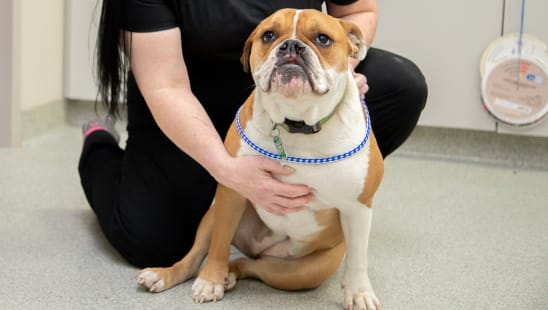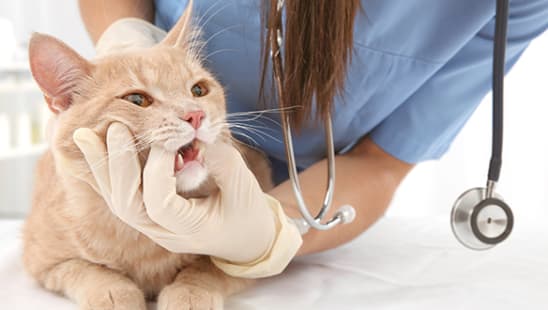Just like us, our pets need healthy teeth and gums. Our Thomasville Veterinary Hospital Urgent Care + Surgery veterinarians provide extensive dental care and surgery for cats and dogs.

Dental Care for Cats & Dogs
Your pet's oral health is critical to their overall health and wellbeing.
Just like us, their teeth can break, orthodontic problems can impact their quality of life, and cavities can become an issue. In fact, periodontal disease is common among cats and dogs.
At Thomasville Veterinary Hospital Urgent Care + Surgery, we offer comprehensive dental care, dental surgeries, cleaning and polishing teeth, and education about at-home care.
Annual Dental Checkups & Cleanings
Your pet needs a dental exam at least once a year. If your cat or dog is more prone to dental problems, they may need to visit more often.
At Thomasville Veterinary Hospital Urgent Care + Surgery, we assess, treat, and help prevent dental problems in cats and dogs.
- Symptoms
Bring your dog or cat in for a dental checkup if you notice they are experiencing any of these symptoms:
- Bad breath
- Loose or broken teeth
- Extra teeth or retained baby teeth
- Discolored teeth
- Tartar buildup
- Abnormal chewing, drooling, or dropping food from the mouth
- Reduced appetite or refusal to eat
- Pain or swelling in or around the mouth
- Bleeding from the mouth
- Assessment
First, we'll perform a thorough pre-anesthetic physical exam on your pet.
We evaluate your pet's blood and urine analyses to ensure it is safe for your pet to undergo anesthesia. Additional diagnostics such as an ECG or chest radiographs will also be conducted, if required.
Once your pet is safely under anesthesia, we perform a full oral examination (tooth by tooth) and charting.
- Treatment
While your pet is still safely under anesthesia, we clean and polish the crowns of the teeth and under the gum line.
Each tooth is probed and a dental sealant is applied to retard the attachment of plaque. If advanced periodontal disease is found, a treatment plan will be developed and discussed with you at the end of the day.
- Prevention
We'll schedule a complimentary follow-up examination two weeks after the assessment and treatment appointment.
At this visit, we will discuss implementing teeth brushing at home as well as other products available that can help improve your pet's oral health.
Dental Health FAQs
- Why is pet dental health important?
Pet dental health is linked to overall physical health and wellbeing. Just like us, periodontal disease and gum issues can occur in our pets. Gingivitis can attack their gums and impact their oral health.
If not brushed away, plaque can stick to teeth and turn into tartar, which can lead to infections in an animal’s mouth. This can result in infections, periodontal disease and even tooth loss. Other problems may also develop in the liver, heart, kidney and lungs.
That’s why our animal friends need regular dental care to prevent pain or gum disease. We can assess, treat and help prevent dental health problems in your cat or dog.
- What are some common cat & dog dental problems?
Common dental problems in both cats and dogs include periodontal disease, bad breath, plaque, gingivitis and tooth loss. In addition, once periodontal disease takes hold, bacteria can develop in the exposed root canals of the teeth for cats and dogs. This can slowly destroy a tooth root and its attachment to the jaw, and lead to a tooth root abscess.
- How can I tell if my pet has oral hygiene issues?
Your furry friend's behavior may be an indication of oral health problems. While dogs may drool excessively (drool may contain pus or blood), other animals may have bad breath. Cats tend to hide more when experience health problems, or may exhibit aggressive behavior.
Gums can swell and you may notice discoloration on teeth due to plaque stains. Some pets experience pain that can stop them from eating.
You can find more symptoms listed to the left under Annual Pet Teeth Cleaning & Exams.
- What types of problems can your veterinary dentist help with?
Your veterinary dentist can assess your pet’s oral health symptoms, treat issues and help prevent future occurrences. From cavities to gum and periodontal disease, fractures in the teeth and jaw and other conditions, the dentist can provide the veterinary care your cat’s or dog’s oral health requires.
They can also perform a number of procedures such as extractions and jaw fracture repair surgeries.
- Will my pet be in pain after dental surgery?
Before, during and after surgery, we take every step to ensure your pet’s comfort and prevent or minimize pain due to dental surgery as much as possible.
Taking a balanced approach to anesthesia, we’re able to effectively complete dental procedures with less stress and pain for your pet.
- What can I do to protect my cat or dog's oral health?
An at-home oral care routine is just as essential to our pets as it is to us. Brush your pet’s teeth regularly and give them dental chew toys to help remove plaque.
Keep things that can damage their teeth, such as toys, bones or objects that are too hard and may cause fractures, out of reach. Always contact your veterinarian with any questions or concerns you may have about your pet’s oral health.
Anesthesia & Your Pet's Oral Health
When you go to the dentist, you know that the procedures your dentist performs are designed to help you and keep your mouth healthy.
Your pet does not understand this – and he or she will react to dental procedures by struggling, trying to escape, or even biting.
Anesthesia allows us to perform dental procedures effectively with less stress and pain for your pet.
We want your pet to be comfortable and relaxed so we can provide the most beneficial care for their health.
If your pet is scheduled for a procedure that may require anesthesia and you have questions about the process or what to expect, please call our office to learn more.

